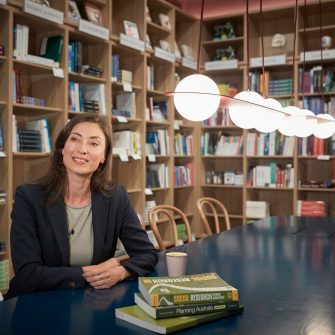
About the Doctor of Philosophy (PhD) in Economics
The UNSW School of Economics invites outstanding undergraduate, honours, master’s students and graduates to join our PhD program. You will be joining a program that combines rigorous training with personalised mentorship in a world-class research environment. We have a strong record of securing competitive academic and policy-focused positions for our students, both internationally and within Australia.
We are one of the top economics departments in Australia and rank #40 globally for Economics & Econometrics in the latest QS World University Rankings. Our faculty are among the most-cited economists in the country and publish regularly in the field’s flagship journals.
More information:
Our PhD program starts with one year of rigorous coursework covering microeconomics, macroeconomics, and econometrics, followed by specialized field courses in your second year. You will engage in mentored research projects from the outset, facilitating a smooth transition to independent research starting in your second year. While our program primarily prepares you for an academic career, it also opens pathways to careers in consulting, government, industry, and the non-profit sector.
Most of our PhD students receive comprehensive financial support, including a tuition waiver and a generous annual stipend of approximately A$35,000–A$45,000, for four and a half years. Our most research-intensive students also receive a fellowship that provides an additional year of support. Additionally, we provide substantial research funding each year for attending domestic and international conferences, as well as access to our state-of-the-art experimental lab.
Before formally applying or contacting potential supervisors, you must complete an Expression of Interest (EOI) by sending the required material to econ.hdr@unsw.edu.au. Please read the "Instructions for Applicants" section below.
PhD program structure
Stream 1: 1 year of Master's Coursework + 3 year PhD Program (fully funded for coursework and PhD)
Key Information:
- 1 year of Master's Coursework + 3 year PhD Program (fully funded both for coursework and PhD)
- The program starts in Term 1 (early February)
- No part-time option is available
Year One: Master of Pre-Doctoral Business Studies (MPDBS)
Year one will equip you with the skills required to identify, analyse and solve problems in the field, while helping you formulate your research agenda and identify potential thesis supervisors for the PhD component of the program.
You will undertake coursework covering microeconomic and macroeconomic theory, econometrics and applied economic analysis. You’ll also have the opportunity to develop practical research skills by assisting in research projects. Upon successful completion of the first year, you’ll be awarded a Master of Pre-Doctoral Business Studies.
A brief overview of the first year is presented below. Please visit the UNSW Handbook for full course structure details.
- Term 1: COMM8100 +ECON7001 + ECON7004
- Term 2: COMM8102 + ECON7002 + Research Assistance Work
- Term 3: COMM8103 + ECON7101 + ECON7102
Year Two: Specialised Coursework and Identification of Thesis Topic
Year two will help you in further developing skills specialized towards dealing with the challenges relevant to your research topic. You’ll continue in the Economics stream with a further year of advanced coursework.
You’ll choose up to eight additional research courses from a range of electives in consultation with your supervisor and PGRC, with the opportunity to take subjects outside of your specialised discipline. In year two, you’ll also be identifying your thesis topic with the aid of your supervisor.
You’ll engage in literature review and research design and present your research proposal to the School of Economics at the end of the year.
Years Three – Four: Original Research and Your Doctoral Thesis
In the final three years of the program, you will be focused on conducting full-time research and completing your doctoral thesis.
This is your opportunity to address some of the biggest challenges at the frontier of Economics and make a significant contribution to the field. Your research will offer new ways of critical thinking and withstand critical analysis from expert researchers in the area.
Stream 2: Direct Entry into the 3-year PhD Program
Key Information:
- Direct Entry into the 3 year PhD Program
- Note: it requires outside scholarship (or ARC Funding Support from your selected supervisor) AND a degree in Economics with research component (e.g., First-class Honours or Master’s in Economics)
- You are expected to start in Term 1 (early February)
- A part-time option may be available (subject to approval)
Year One: Coursework and Identification of Thesis Topic
Year one will equip you with skills required to identify, analyse and solve problems relevant to your research topic.
You’ll choose up to eight research courses from a range of electives in consultation with your supervisor and PGRC, with an opportunity to take subjects outside of your specialised discipline.
These will include the four core courses listed below (unless you are exempted from taking them). You’ll also be identifying your thesis topic with the aid of your supervisor.
You’ll engage in literature review and research design and present your research proposal to the School of Economics at the end of the year.
Years Two – Three: Original Research and Your Doctoral Thesis
In the final three years of the program, you will be focused on conducting full-time research and completing your doctoral thesis.
This is your opportunity to address some of the biggest challenges at the frontier of Economics and make a significant contribution to the field.
Your research will offer new ways of critical thinking and withstand critical analysis from expert researchers in the area.
Instructions for Applicants
Before formally applying or contacting potential supervisors, you need to complete the Expression of Interest (EOI) process by sending the following material to econ.hdr@unsw.edu.au. The EOI process opens 1 May 2025 and closes 10 August 2025. Only selected applicants will be invited to apply via the UNSW central portal.
Important: make sure that you satisfy the UNSW academic and language entry requirements before submitting your EOI. Please read the Entry Requirements section below.
-
Subject: MPDBS Application
Main Body:
- Your name, citizenship, and whether you are a citizen or permanent resident of Australia.
- Your degree(s), institution(s) and year(s) of completion of previous studies.
- A list of advanced economics, mathematics and statistics courses taken and the grades you obtained for these courses.
- Names of two references (recommendation letter writers) and their contact details (e.g., affiliation, title, email).
- Names of two academics you wish to work with at UNSW.
- Three to five academic papers you have recently read that are relevant for your research interest.
Attachments (in PDF):
- Your academic CV.
- Your official academic transcripts from previous degree(s).
- Your official GRE results.
- A research proposal or statement of purpose.
- If applicable, proof of your English Language requirement.
-
Subject: Direct Entry PhD Application
Main Body:
- Your name, citizenship, and whether you are a citizen or permanent resident of Australia.
- Your degree(s), institution(s) and year(s) of completion of previous studies.
- A list of advanced economics, mathematics and statistics courses taken and the grades you obtained for these courses.
- Names of two references (recommendation letter writers) and their contact details (e.g., affiliation, title, email).
- Names of two academics you wish to work with at UNSW.
- Three to five academic papers you have recently read that are relevant for your research interest.
- A description of your Honours or Master’s thesis.
- Your funding source: outside scholarship, external grant, or support from potential supervisor.
Attachments (in PDF):
- Your academic CV.
- Your official academic transcripts from previous degree(s).
- Your official GRE results.
- A research proposal or statement of purpose.
- If applicable, proof of your English Language requirement.
- A copy of your Honours or Master’s thesis.
-
Academic Entry Requirement
The minimum academic entry requirement for Stream 1 is the equivalent of a four-year UNSW Bachelor’s degree in a relevant discipline (Economics, Finance, and related subjects) with first or upper second class honours. The minimum academic entry requirement for Stream 2 is the equivalent of a four-year UNSW Bachelor’s degree with an Honours year (research), or the equivalent of a UNSW Masters’ degree with substantial research component with first or upper second class honours.
Note: an upper second class honours is equivalent to a weighted average mark of at least 75/100 (i.e., a Distinction) at UNSW and is allocated to roughly the top 30% of students. Grading systems vary across countries. For more information, read this guide for grade equivalencies between countries.
If you are unsure if you satisfy the academic entry requirement, contact us at econ.hdr@unsw.edu.au and we will provide feedback.
English Language Requirement
UNSW recognises the follow countries as English-speaking: American Samoa, Australia, Bahamas, Barbados, Belize, Botswana, Canada, Fiji, Gibraltar, Ghana, Guyana, Ireland, Jamaica, Kenya, Lesotho, Liberia, New Zealand, Nigeria, Papua New Guinea, Singapore, Solomon Islands, South Africa, The Gambia, Tonga, Trinidad and Tobago, United Kingdom (including Northern Ireland), United States of America, Zambia, Zimbabwe.
If you are not a citizen of an English-speaking country, then you will need to establish that you have sufficient English language fluency. There are four ways to establish sufficient English language fluency: English Tests (including IELTS, TOEFL, Pearson and Cambridge), UNSW Global English Course, Prior Study, or an English Waiver. For details on each of these, please review our English language requirements.
If you are unsure if you satisfy the academic entry requirement, contact us at econ.hdr@unsw.edu.au and we will provide feedback.
Academic Placements
-
- Toulouse School of Economics, Postdoctoral Researcher
- University of Bologna, Department of Economics, Research Fellow
- The National University of Singapore, Asia Competitiveness Institute, Research Fellow
- Monash University, Centre for Global Business, Research Fellow
- University of Oxford, Magdalen College, Research Fellow, then ETH Zurich, Department of Management, Technology and Economics, Assistant Professor
- Shenzhen Research Institute of Big Data, Research Fellow
- Monash University, Department of Econometrics and Business Statistics, Research Fellow
- The University of Melbourne, School of Mathematics and Statistics (Lecturer)
- University of New South Wales, CEPAR, Research Fellow
- University of Sydney, School of Economics, Research Fellow
- Wuhan University, Economics and Management School, Assistant Professor
- Australian National University, ANU College of Business and Economics, Associate Lecturer
- East China University of Science and Technology, School of Business, Lecturer
- University of Toronto, Department of Economics, Research Fellow
- South China Normal University, School of Economics and Management, Lecturer
- University of Sydney, Research Fellow, then University of Technological Sydney, Economics Discipline, Chancellor's Post-Doctoral Research Fellow
- University of Geneva, Faculty of History, Economics and Society, Research Fellow, then South Mediterranean University, Mediterranean School of Business, Assistant Professor
- Southwestern University of Finance and Economics, School of Public Administration, Associate Professor
- International University of Japan, Graduate School of International Relations, Assistant Professor
- University of New South Wales, School of Economics, Research Fellow
- University of New South Wales, CEPAR, Research Fellow
- Shanghai Tech University, School of Entrepreneurship and Management, Assistant Professor
- University of New South Wales, School of Economics, Research Fellow
- University of Bath, Department of Economics, Lecturer
- University of New South Wales, CEPAR, Research Fellow
- Sun-yat Sen University, Department of Economics, Assistant Professor
- University of Technology Sydney, Research Fellow, then Macquarie University, Centre for the Health Economy, Honorary Research Fellow
- Zurich University of Applied Sciences, ZHAW, Research Fellow
- Jinan University, Institute for Economic and Social Research, Assistant Professor
- University of Melbourne, Melbourne Institute of Applied Economic and Social Research, Research Fellow
- Curtin University, School of Accounting, Economics and Finance, Lecturer, then Macquarie University, Macquarie Business School, Lecturer
- University of Technology Sydney, CHERE, Research Fellow
- University of Peradeniya, Department of Agricultural Economics and Business Management, Professor
- University of Technology Sydney, CHERE, Research Fellow
- University of Technology Sydney, CHERE, Senior Research Fellow
- Monash University, Centre for Health Economics, Research Fellow
- Monash University, Monash Business School, Research Fellow
- UNSW, School of Economics, Research Fellow
- Durham University, Business School, Lecturer
- UCL Australia, Faculty of Engineering Science, Lecturer
- Shandong University, School of Economics, Assistant Professor
- University of Sydney, Charles Perkins Centre, Research Fellow
- University of Mannheim, Department of Economics, Research Fellow, then Monash University, School of Economics, Lecturer
- University of Tasmania, Tasmanian School of Business and Economics, Lecturer
- City University of London, Department of Economics, Lecturer
- Shangdong University, School of Economics, Lecturer
- University of Melbourne, Melbourne Institute of Applied Economic and Social Research, Research Fellow
- Fukushima University, Faculty of Economics and Business Administration, Associate Professor
-
Your PhD will set you on the path to a career in a premier research institution, anywhere in the world. Throughout your research degree, you’ll also have many opportunities to develop your teaching portfolio.
Beyond academia, there’s also significant demand in the private and public sectors for people with deep knowledge and sound research and analytical skills*.
Whether you’re looking to pursue a career in academia, or take your research skills out to industry, a PhD in Economics from UNSW will get you there.
* Source: 2019 Advancing Australia’s Knowledge Economy Report

Degree type
Postgraduate Research
Commencing terms
Term 1 – February
Program code
1540
Delivery mode
On Campus
Domestic / International
Domestic
International
Useful links
Discover
Accreditation







